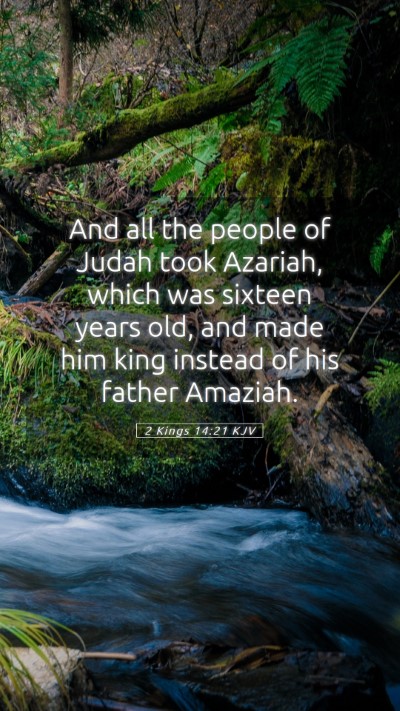Understanding 2 Kings 14:21
Bible Verse: 2 Kings 14:21 - "And all the people of Judah took Azariah, which was sixteen years old, and made him king instead of his father Amaziah."
Overview of 2 Kings 14:21
This verse marks a significant transition in leadership within the kingdom of Judah. It highlights the circumstances leading to the coronation of Azariah (also known as Uzziah) as king at a very young age, specifically at sixteen. Such a scenario prompts various interpretations and insights that unveil the broader implications within the historical and spiritual context of the scripture.
Bible Verse Interpretations
-
Historical Context:
Following the reign of king Amaziah, who had his moments of faithfulness mixed with folly, the people’s choice to crown Azariah suggests a reaction to the political and spiritual climate of the time. Matthew Henry notes how the people of Judah were keen to establish a leader who could bring stability after Amaziah’s defeat in battle. This reflects both a desire for continuity and the aspirations of the people for a king who might be more aligned with their needs.
-
Age and Leadership:
The choice of a young king such as Azariah also represents an interesting commentary on youth and authority. Adam Clarke emphasizes that age does not restrict capability. This choice may suggest that the people hoped for fresh ideas and a vigorous reign that might rejuvenate their kingdom after tumultuous times. In biblical leadership, youthful vigor can often be paired with divine wisdom, as was seen in other young monarchs.
-
The Role of the People:
This verse illustrates the agency of the people in leadership selection, indicative of a broader theme in Kings where the collective will of the people impacts governance. Albert Barnes elaborates on this point, affirming that the people’s consent is crucial in establishing a ruler, highlighting the social contract that existed between the reign and the citizens in Judah. This underscores the importance of community in the biblical narrative.
Bible Study Insights
For those engaging in Bible study groups or seeking online Bible study resources, 2 Kings 14:21 serves as a springboard for discussing the impact of leadership on societal well-being. Analyzing this verse in conjunction with the actions that followed Azariah's rise can promote deeper understanding of the values evident in biblical kingship and governance.
Key Themes to Explore
- The Nature of Kingship: Reflect on the qualities that define a good leader in biblical terms and how these qualities manifest in the lives of subsequent kings in Judah.
- God's Sovereignty: Examine how God's plan unfolds through the seemingly impulsive decisions made by the people, showcasing the divine orchestration behind human choices.
- Youth and Wisdom: Investigate the relationship between youth, wisdom, and leadership, pulling in examples from other scriptural contexts where young leaders played pivotal roles.
Biblical Exegesis
The exegesis of this verse draws on the broader narrative found in 2 Kings. Azariah's ascension can be viewed through various lenses — political necessity, familial heritage, and divine will. This leads to questions about the expectations placed upon young leaders and the responsibilities entrusted to them. The interpretations allow for rich discussions around the themes of growth, legacy, and the fulfillment of God’s promises to Israel.
Related Bible Cross References
- 2 Chronicles 26:1-5 - Further details on Azariah’s character and accomplishments.
- 2 Kings 14:20 - Contextual background on Amaziah's death and the state of Judah.
- 1 Samuel 16:7 - Reflecting on aspects of divine selection and the heart's view in leadership roles.
Application to Daily Life
Applying the lessons from 2 Kings 14:21 invites personal reflection on how leadership roles manifest in our lives today. Whether in our families, communities, or workplaces, recognizing the weight of responsibility and the influence of our choices can lead to more mindful and effective leadership. The significance of the verse encourages one to assess their capabilities, regardless of age, when assuming leadership positions and to seek divine guidance in all decisions.


